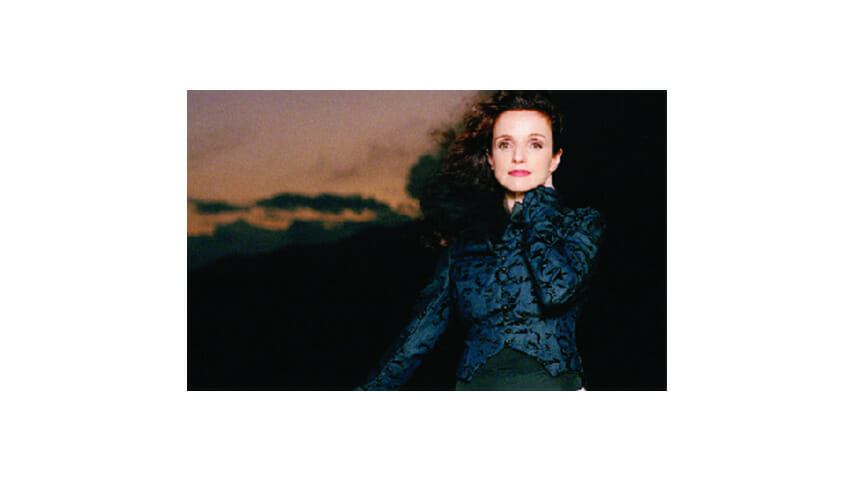
Patty Griffin composes a batch of hymns to that awful silence
I think being human’s a pretty lonely experience for a lot of us,” Patty Griffin recently told the Albuquerque Journal. “No matter how busy we keep ourselves, you’re kind of out there on your own.”
I’m no Dr. Phil. I can’t neatly break down for you what drives Ms. Griffin, but I do know that her best songs are among the loneliest sounding recordings I’ve ever heard. Like anyone else, I see her tiny frame and hear that big, booming voice that so quickly turns delicate and soft, and in its best moments breaks off as it runs out of air. I’ve read about how the breakup of her marriage led her to write the songs for her 1996 debut Living With Ghosts, and then I consider that she got even better, writing “Useless Desires” for her last album, 2004’s Impossible Dream (so it was no surprise when Paste ranked her 19th on its list of the 100 Best Living Songwriters). The line, “Everyday I take a bitter pill … to help me not to wonder how I ended up like this,” brings a tear of recognition. It also makes the “pretty lonely experience” of which Griffin sings a bit less lonely. Collective mourning brings us together. People who need their music fused with overwhelming positivity may not understand Griffin’s appeal, but for anyone’s who’s felt a hellhound on his trail or stared into the glacial isolation of a Northern sky, the bond is strong and permanent.
Her career has been a rollercoaster. Griffin signed to A&M on the basis of a demo tape that ended up becoming her debut album once the sessions with Daniel Lanois acolyte Malcolm Burn were met with record-company disapproval. Label chaos left her without proper promotion for her follow-up, 1998’s Flaming Red, and then an album, Silver Bell, never made it out of the can and left Griffin temporarily without a record deal. In the meantime, other well-established musicians from Emmylou Harris to Bette Midler to the Dixie Chicks recorded her songs. And she’s since been hooked up with Dave Matthews’ artist-friendly ATO Records, where she’s recorded several albums that sound like the work of an unforced artist. Every cloud, it seems, has a silver lining. But why so many clouds?
Griffin isn’t one to draw attention to herself. Her best material has always been her gently unfolding wallflower portraits. She can wail with the best of them and usually finds a few choice spots on each album to air out this talent. Children Running Through is no exception. “Stay on the Ride” sports a funky backdrop with uptown horns for her to kick up her cowboy boots to, while “Getting Ready” delivers a kiss-off (“I’m getting ready to let you go”) to a demanding railroad rhythm. But they are diversions we accept as the necessary setup for her natural forte as a singer of quiet, desperate songs.
It’s a folksinger’s dangerous terrain, where the subtleties threaten to put the audience to sleep, where word choice means more than a guitar lead as a song hangs in the balance, and where you can watch your career land in the netherworld of permanent cultdom as the excitement level corresponds not with the quickening of the pulse but to the hairs on the back of your neck suddenly spiking up. There’s no safety net. It comes down to the voice. Griffin stole Bruce Springsteen’s “Stolen Car” out from under him just by turning her voice to a near whisper, letting its natural cry inform the desperate lyrics until the tension was insurmountable. Every one of her albums has these moments.
She begins Children with “You’ll Remember,” a modern spiritual constructed in near silence, her voice echoing off the cathedral walls as gently brushed drums and a standup bass provide the backdrop with an organ barely puncturing the ghostly aura. She breaks the spell with the aforementioned “Stay on the Ride” before settling back in with “Trapeze,” a loose duet with Emmylou Harris that’s an emotional tug of war-people are drawn to the daring adventures of the risk-taker only to find solace when, “one of these nights the old girl’s going down.” Griffin’s characters may never completely trust love but they’ll always understand conflict.
Like she recently did while guesting on Solomon Burke’s Nashville, Griffin dons her gospel best for Children, trilling alongside a solemn piano until her every limb is loosened. The album’s most dramatic moments, however, come courtesy of string arranger John Mark Painter, who conducts a collection of violin, viola and cello players to breathtaking effect. “Burgundy Shoes” is a snapshot of childhood recollected with simple piano notes that are suddenly joined by his orchestral sweep, adding a cinematic score to this modest bus ride to Bangor, while “I Don’t Ever Give Up” manages a quiet loudness that never overpowers Griffin’s fragile delivery.
Fancy up her surroundings all you want, but like another transcendent, intuitive singer-Van Morrison, in whose company she belongs-it’s the way she sings (listen to her delivery of the line, “And these sorrows I’m crying over” on the album’s final track) that defines her greatness, as lonely as it might be.